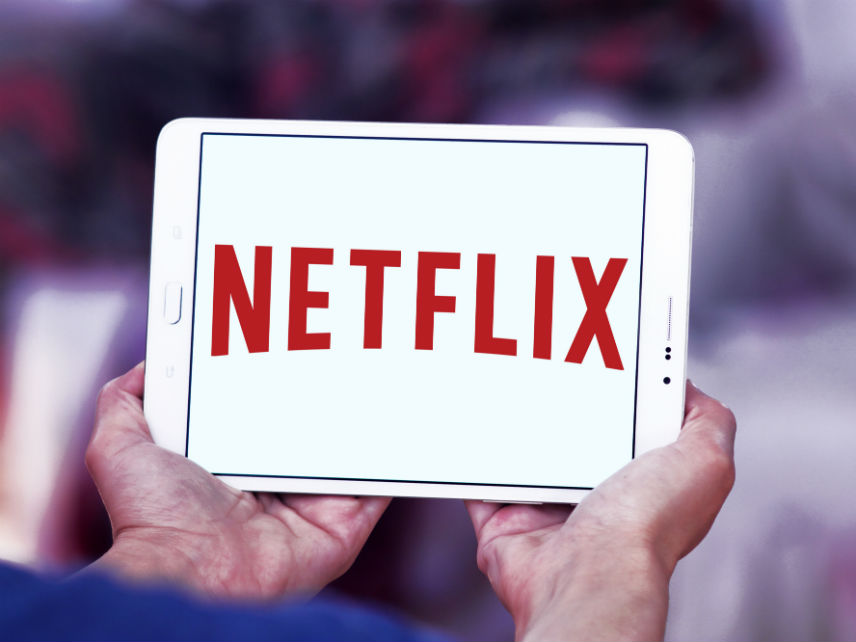Netflix Uses Cheaper Subscriptions to Bring Its Service to More Communities
Capitalism not only helps reduce poverty, but can bring services to more diverse groups of people.

Netflix is seeking to expand access to its services with a new kind of subscription. TechCrunch reports that the streaming service has been quietly testing out a mobile-only service for just $4 a month in Malaysia. That's nearly half the price of its "Basic" package in the country. A spokesperson for the company confirmed that similar trials were "running in a few countries," though they declined to provide further details.
As TechCrunch explains, Netflix has 79 million users outside of the United States but its current pricing model makes it too expensive for vast numbers of potential customers. Rival services in Asian countries begin at $3 a month. A mobile-only service charging $4 a month would allow Netflix to compete in a place like India, for example.
While bashing capitalism is increasingly popular, Netflix is just the latest example of how the profit motive can drive a company to do something wonderful for consumers. The competition for marketshare between Netflix and its rivals is good for consumers, who will soon be able to pay less for the popular streaming service because of capitalism. We can also thank global capitalism for cutting by nearly half the number of people living on less than $2 a day. Similarly, the number of people living on less than $1 a day is a third of what it was in the 1980s.
Businesses have found a way to offer much desired services to lower income consumers in the U.S. as well. In 2016, Whole Foods announced plans to open up a store in Englewood, one of the most economically depressed neighborhoods in Chicago. Seeking to promote access to healthy food in the area and expand its customer base, the company priced its products to be competitive with more conventional grocery stores. Capitalism actually does what socialism says it could do if it had control of the entire market.
Editor's Note: As of February 29, 2024, commenting privileges on reason.com posts are limited to Reason Plus subscribers. Past commenters are grandfathered in for a temporary period. Subscribe here to preserve your ability to comment. Your Reason Plus subscription also gives you an ad-free version of reason.com, along with full access to the digital edition and archives of Reason magazine. We request that comments be civil and on-topic. We do not moderate or assume any responsibility for comments, which are owned by the readers who post them. Comments do not represent the views of reason.com or Reason Foundation. We reserve the right to delete any comment and ban commenters for any reason at any time. Comments may only be edited within 5 minutes of posting. Report abuses.
Please to post comments


Under socialism you've got a single boss making sure you get your job done, under capitalism you've got thousands of bosses making sure you get your job done. Under socialism as long as you please that one boss your job is safe, under capitalism any one of those thousands of bosses can fire your ass.
What about the dynamics of the relationship between the boss and the public. For instance if you own a trucking company shit will inevitably fall off the trucks into the roadway causing uncompensated losses for other people. When a company pollutes others suffer the damage. I think libertarians would do well to also focus on the way private individuals take property without compensation.
Your example does not compute. Things falling off a truck are a relatively minor problem for the other people sharing the roadway but a major problem for the guy who owns the truck. The things falling off are either product that he's being paid to transport or parts of the truck itself. In either case, the truck owner has a direct financial incentive to make that happen as little as possible.
Now, if you're saying that we should have laws against littering, I don't think even the most ardent libertarian would disagree with you. But beyond that point, your argument does not make sense.
The same people that bash capitalists as greedy sociopaths only concerned with profit are the same people who complain when capitalists make something better and cheaper and more widespread.
So Netflix has a way to tell if you are Chromecasting your mobile only service to a big screen?
Or did they just shoot themselves in the foot?
Why would it matter to them if you watch it on your tiny screen or a big tv?
Lower resolution = less bandwidth. I'm not sure you'd want to watch a blurry-ass mobile resolution on your TV.
Netflix is OK in my book, especially since signing a major production deal with the Obamas. Of course conservatives pounce on that old "at some point you've made enough money" quote to speculate that post-Presidency Obama is getting rich enough that pre-Presidency Obama would disapprove. But that's a baseless, nonsensical attack. Good for the President, I say. I hope he's making tens of millions of dollars.
Also, I wonder if Hulu has similarly great deals available? The Handmaid's Tale is the most important show on TV right now because of its terrifyingly accurate depiction of the misogynistic theocracy Drumpf is trying to create in the US. People all over the planet need exposure to this show and its timely message.
You know, I used to think you were joking about the Handmaid's Tale. But then I read this.
Obama's are trash.
So now Asians can spend an hour looking for something to watch before deciding to do something else. Yay.
No kidding, Netflix has the worst interface ever.
But Hulu exists.